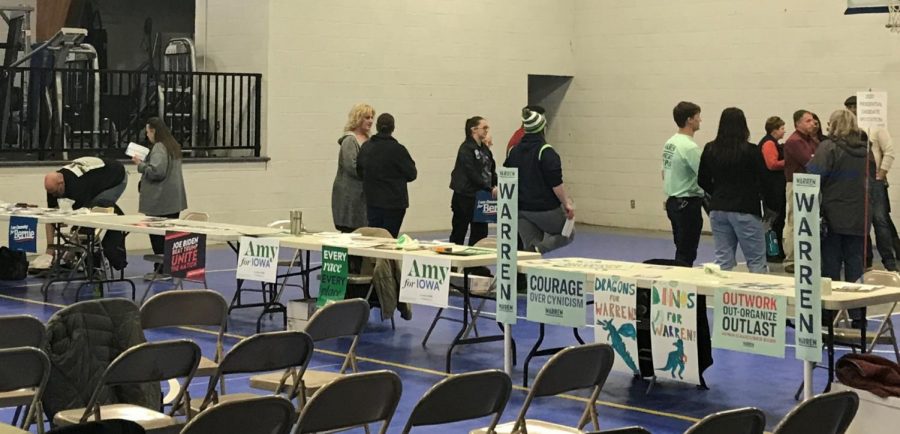The problem with party politics
Since partisan politics is the inevitable result of our pluralist system, we must enact electoral reforms that transcend party lines.
September 25, 2020
233 years ago, in Federalist No. 10, James Madison contended that the multitude of factions (which are groups of citizens, especially with a common interest adverse to others) in our country would encourage compromise and deter tyranny. Was he correct?
First, we must acknowledge the various factions that exist in modern American politics. Interest groups and political parties are the most prominent. But evidence that these groups’ mere existence deters tyranny is lacking. Despite numerous Supreme Court rulings on the subject, gerrymandering, for example, remains perhaps worse than ever, as it is perpetuated by both parties. Egregious examples of parties rigging the shape of their congressional districts range from Alabama to Illinois. For example, according to The Fulcrum, Alabama has been gerrymandered so much by the state legislature that the majority of Democratic voters are packed into just one district (the 7th). Without this packing, Alabama could potentially have another blue district, but since the GOP controls the redistricting, they do it in their favor. Democrats do the same thing, like in Maryland’s 3rd district, which resembles a snake more than anything reasonable. No matter the state, the party in charge is sure to rig the districts in their favor. This kind of omnipresent gerrymandering, perpetuated by both major parties, raises serious questions about how our Congressional districts are drawn. In practice, voters don’t pick their politicians; politicians pick their voters.
Again, both parties do this. And this is the problem. According to Business Insider, the 116th Congress is the most partisan it has ever been. Compromise seems to be at its nadir. While legislative cooperation isn’t inherently good, it is certainly important when it comes to the Supreme Court, for instance. Unfortunately, due a great deal to Senate Majority Leader Mitch McConnell’s party politics, this ideal will not presently come to fruition.
Since the death of Ruth Bader Ginsburg, McConnell has been working toward an expeditious confirmation of her replacement. In fact, the entire Republican party has been, which is a stark contrast to their attitudes in 2016 with Merrick Garland, President Obama’s pick. Back then, the GOP (the party that claims to care about Constitutional literalism), nine months before the November 2016 election, claimed we should wait until after the election to nominate a Supreme Court Justice. By Inauguration Day, there hadn’t even been a hearing. Of course, the real reason behind McConnell’s flip-flop is that he didn’t want Obama to get another justice confirmed. Now, when it’s the GOP’s turn to replace Ginsburg, they’re all of a sudden claiming she should be replaced as soon as possible. The Democrats are doing no better, claiming the opposite, according to the Hill.
In 2017, when the Senate was confirming Neil Gorsuch (whose seat could’ve gone to Garland), the Republicans quickly realized they didn’t have the 60 votes needed to invoke cloture and end the filibuster. So, according to NPR, McConnell just changed the rules, requiring only a simple majority, leading to Gorsuch’s confirmation. This is again a stark contrast to Garland’s attempt at confirmation, during which the GOP did not hesitate in the slightest to filibuster at every opportunity. Clearly, partisan procedural politics is the inevitable result of pluralist politics, which is what we have now. Senators aren’t working for the American people. They’re playing for a team: their party, especially when it comes to the courts. After all, the Supreme Court isn’t supposed to be this partisan; it’s supposed to be just the opposite. Yet ever since Reagan’s controversial Robert Bork nomination, the Court, and Congress too, has slowly shifted in that partisan direction.
For example, when Obama was attempting to pass the Affordable Care Act, McConnell and other Republicans did the same thing, engaging in every possible attempt to block the bill’s passage. What makes this incredible is that the GOP, as Mother Jones noted, previously supported the individual mandate, the cornerstone provision of Obamacare (which in reality is just a corporate handout). It was Newt Gingrich, Chuck Grassley, Mitt Romney and the Heritage Foundation’s plan. Yet when Obama gave them their own plan, they hypocritically smeared it as radical and irrational. The kind of present party-based system we have, therefore, discourages policy-based voting and encourages party-lines-based voting, which minimizes consistency.
This kind of partisanship doesn’t come just from the GOP, however; the Democratic Party does the same thing. Franklin Roosevelt, as the Washington Post recalled, tried to pack the courts by capping justices’ ages. Harry Reid, former Democratic Senate Majority Leader, was also well known for using or eliminating the filibuster to the Democratic advantage, as the Washington Post reported. Establishment Democrats smeared the left for being a Bernie-following monolith yet branded them as reactionary and dangerous when they didn’t immediately fall in line behind Biden. Both parties only care about ‘standards’ and ‘procedure’ when it’s convenient for them. If we had electoral or party diversity, as opposed to being dominated by one conservative and one neoliberal party (both of which seek only to enrich themselves), gridlock would likely be less of an issue.
What is the broader solution to these party issues? There are many policies we can implement to make our electoral system less corrupt and more fair. However, since we’ve shown that political parties are the root of many of these issues, we must address them directly. A voting system where all that appears on a ballot is the candidate’s policies, quotes and record (not their name, party nor any demographic information which some voters could use to discriminate against them) is far more likely to solve the previously mentioned problems. It would incentivize real issues-based voting, not straight-blue or straight-red tickets. Eventually, we could abolish political parties entirely, evaluating candidates solely based on their merits and not on the letter next to their name. Removing the powers of the party would therefore bring the powers to the people, at least in terms of selecting leaders and constructing legislative districts. It would also negate the influence of corporate contributions. And, as WBUR said, it would increase voter awareness while also ensuring that politicians would be “advocates for particular policy remedies, not tribal representatives.”
Some might contend that such a system would disincentivize voter turnout. One way to counter this potential issue is to provide tax incentives for voting and create free programs for prospective voters to learn about civics. This would maximize turnout. But this still doesn’t address the corruption in Congress or the Supreme Court. To these dilemmas, I propose having nonpartisan commissions redraw districts to maximize simplicity and accuracy. I also propose that the appointment of Supreme Court justices should be controlled by an independent commission of the American Bar Association, not the President and Senate. This allows for a simpler judicial process.
There are many more reforms we can consider, such as banning corporate contributions. But whatever the solutions to our present party politics might be, we must make sure to widen the gap between politicians and corporations and narrow the gap between the people and the power.









